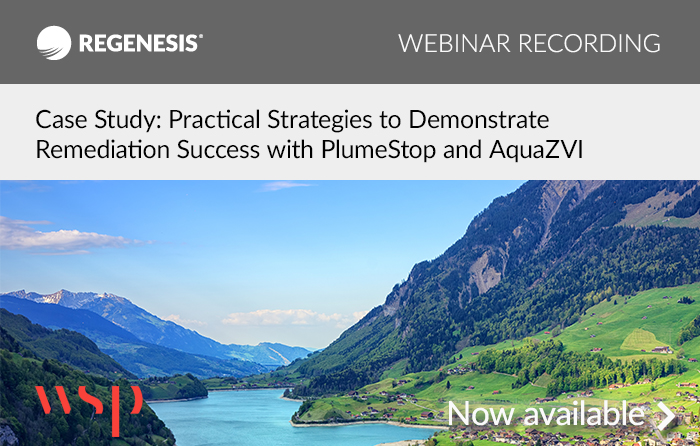
In this webinar we were pleased to have as a special guest speaker Matthew Burns, Technical Fellow and the U.S. Contaminated Land National Service Line Director for WSP. He presented PlumeStop and colloidal ZVI (cZVI) treatment case studies and practical analytical strategies used to demonstrate destructive treatment of groundwater contaminants.
Stimulating biodegradation of chlorinated VOCs on activated carbon and direct abiotic treatment of contaminants using reduced metals such as ZVI are not new to the remediation industry and have proven to be highly effective when direct contact is made. However, the colloidal solid composition of these materials severely limits efficient in situ application at most sites. The steric stabilization chemistry behind the REGENESIS products PlumeStop and cZVI eases delivery challenges and dramatically widens the applicability window of these amendments to include most sites where in situ remediation is contemplated.
These transformational amendments bring a unique set of regulatory and performance monitoring challenges when discerning desirable destructive processes from often unacceptable non-destructive mechanisms. This webinar will use case studies and share practical strategies to demonstrate remediation success with PlumeStop and cZVI.
To view the recording of this webinar, please complete the form on this page.
 Matthew Burns
Technical Fellow | U.S. Contaminated Land National Service Line Director, WSP
Matt is a Technical Fellow and the U.S. Contaminated Land National Service Line Director for WSP with more than 25 years of professional chemistry and engineering experience. He is based Boston, Massachusetts and is responsible for the financial and technical depth and breadth of the contaminated land (site investigation and remediation) service line. Matt also brings chemical and microbial process expertise to assist local WSP teams with challenging investigation and remediation projects in the U.S. and across the globe. His area of expertise includes practical application of microbial and chemistry-based innovative remediation. He has authored numerous publications and conference platform presentations and is a frequent lecturer at continuing education workshops and webinars. Recently, he has been publishing and lecturing as part of the U.S. Environmental Protection Agency (EPA), National Groundwater Association (NGWA) and Northeast Waste Management Officials Association (NEWMOA) combined remedy initiative. Matt’s expertise in this area relates to stimulating multiple in situ degradation pathways with a single amendment application to more efficiently and cost effectively treat volatile organic compound-affected groundwater. Matt is on science advisory boards for non-profit educational and commercial entities. He is also on the editorial review board for the journal Remediation Journal. He holds a Bachelor of Science degree in Environmental Science from the University of Massachusetts at Amherst and a Master of Science degree in Civil/Environmental Engineering from the University of Maryland at College Park.
Matthew Burns
Technical Fellow | U.S. Contaminated Land National Service Line Director, WSP
Matt is a Technical Fellow and the U.S. Contaminated Land National Service Line Director for WSP with more than 25 years of professional chemistry and engineering experience. He is based Boston, Massachusetts and is responsible for the financial and technical depth and breadth of the contaminated land (site investigation and remediation) service line. Matt also brings chemical and microbial process expertise to assist local WSP teams with challenging investigation and remediation projects in the U.S. and across the globe. His area of expertise includes practical application of microbial and chemistry-based innovative remediation. He has authored numerous publications and conference platform presentations and is a frequent lecturer at continuing education workshops and webinars. Recently, he has been publishing and lecturing as part of the U.S. Environmental Protection Agency (EPA), National Groundwater Association (NGWA) and Northeast Waste Management Officials Association (NEWMOA) combined remedy initiative. Matt’s expertise in this area relates to stimulating multiple in situ degradation pathways with a single amendment application to more efficiently and cost effectively treat volatile organic compound-affected groundwater. Matt is on science advisory boards for non-profit educational and commercial entities. He is also on the editorial review board for the journal Remediation Journal. He holds a Bachelor of Science degree in Environmental Science from the University of Massachusetts at Amherst and a Master of Science degree in Civil/Environmental Engineering from the University of Maryland at College Park.